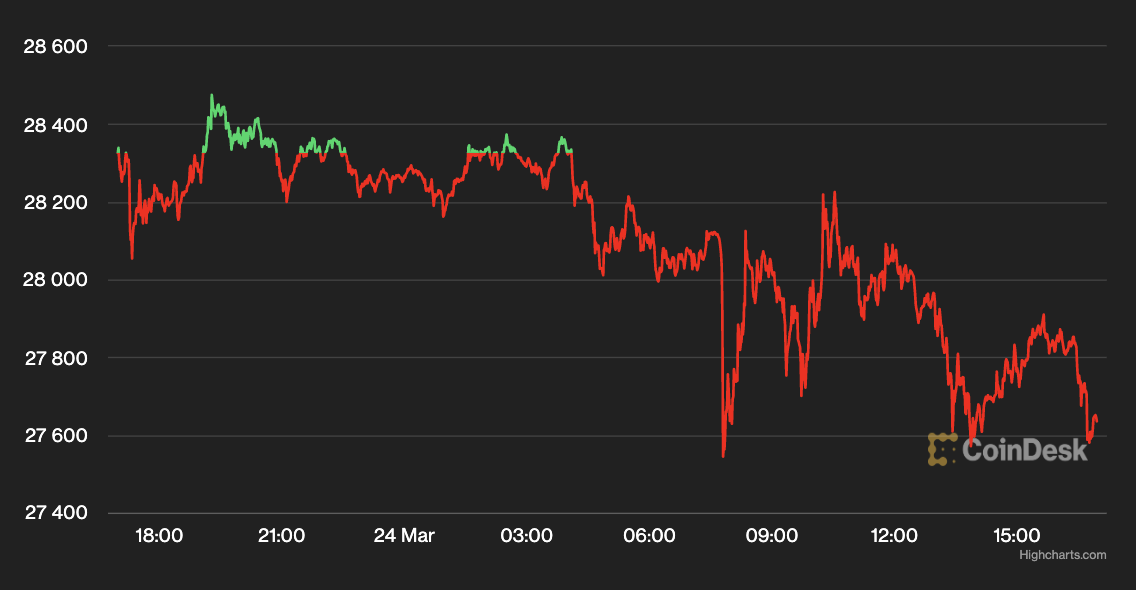Cryptocurrency prices sank Friday as investors grappled with a new threat to the global banking system as well as continuing concerns about U.S. monetary policy.
Bitcoin (BTC), the largest cryptocurrency by market capitalization, was recently changing hands at about $27,450, down more than 2% over the past 24 hours, according to CoinDesk data. BTC rose as high as about $28,300 earlier in the day and is up more than 16% in March.

(CoinDesk Bitcoin Price Chart)
But most risk-on markets were reeling for much of the day after the cost of insuring the debt of financial services giant Deutsche Bank soared to its highest point in four years, raising concerns anew about the strength of the banking sector.
Shares of Deutsche Bank (DB) plunged 14% one point Friday before closing down 3%. Deutsche Bank’s problems come just days after UBS agreed to acquire its troubled rival, Credit Suisse for $3.2 billion, and less than three weeks after the failure of U.S.-based Silvergate, Silicon Valley and Signature banks.
In a newsletter Friday, analysts for bitcoin mining equipment and hosting provider Blockware Solutions said that BTC’s resistance had formed at $28,800, about where it stood during a correction in the summer of 2021.
“This would be a logical place to see BTC make another leg lower, however a continued consolidation here would be welcomed,” the analysts wrote. “This is a fairly pivotal spot for bulls to defend in order to maintain this current bullish structure.”
“A break above this level would obviously be the most ideal scenario for bulls, but if we are going to pull back, we would like to see BTC hold ~$25,200,” they added.
Ether (ETH), the second-largest cryptocurrency, was recently changing hands at $1,745, off 3% from Thursday, same time. Layer 2 blockchain Optimism’s OP token price declined by over 9% to $2.23 from above $2.47 the previous day.
The CoinDesk Market Index, which measures overall crypto market performance, was down roughly 2.7%.
Equity markets edged lower Friday opening before closing in the green as investors recovered from at least some of their banking shock. The S&P 500, Dow Jones Industrial Average (DJIA) and tech-heavy Nasdaq finished up 0.5%, 0.4% and 0.3%, respectively.
“Large banks tend to be interconnected, with shared exposures on syndicated loans, and via a web of repo and other counterparty transactions,” Steve Sosnick, chief strategist at brokerage firm Interactive Brokers, wrote in a note Friday about banking contagion.
“It is logical, though unhelpful, for investors who were burned by one bank to get serious jitters about those that most resemble it,” Sosnick wrote.
He also noted that credit default swaps can be “catastrophic” for bondholders because “it impairs the income stream on which the holders depend,” adding: “As a result, the market value of the bond can fall substantially and precipitously.”
Meanwhile, crypto investors continued to weigh recent regulatory enforcement issues, including a Securities and Exchange Commission (SEC) warning to Coinbase that the agency is pursuing an enforcement action against the exchange for possible securities violations.

